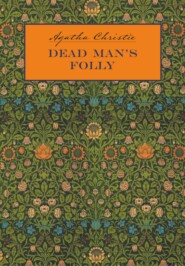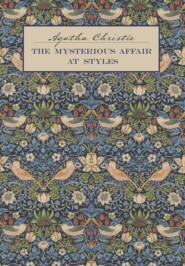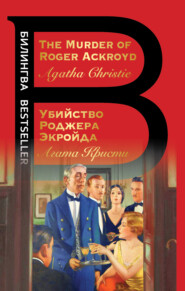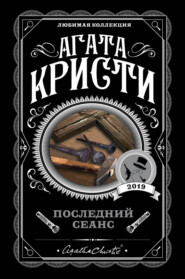По всем вопросам обращайтесь на: info@litportal.ru
(©) 2003-2024.
✖
The Adventure of the Christmas Pudding
Автор
Год написания книги
2019
Настройки чтения
Размер шрифта
Высота строк
Поля
‘And how do I explain myself there?’ asked Hercule Poirot.
Mr Jesmond smiled with confidence.
‘That, I think, can be arranged very easily,’ he said. ‘I can assure you that it will all seem quite natural. You will find the Laceys most charming. Delightful people.’
‘And you do not deceive me about the oil-fired central heating?’
‘No, no, indeed.’ Mr Jesmond sounded quite pained. ‘I assure you you will find every comfort.’
‘Tout confort moderne,’ murmured Poirot to himself, reminiscently. ‘Eh bien,’ he said, ‘I accept.’
The temperature in the long drawing-room at Kings Lacey was a comfortable sixty-eight as Hercule Poirot sat talking to Mrs Lacey by one of the big mullioned windows. Mrs Lacey was engaged in needlework. She was not doing petit point or embroidered flowers upon silk. Instead, she appeared to be engaged in the prosaic task of hemming dishcloths. As she sewed she talked in a soft reflective voice that Poirot found very charming.
‘I hope you will enjoy our Christmas party here, M. Poirot. It’s only the family, you know. My granddaughter and a grandson and a friend of his and Bridget who’s my great-niece, and Diana who’s a cousin and David Welwyn who is a very old friend. Just a family party. But Edwina Morecombe said that that’s what you really wanted to see. An old-fashioned Christmas. Nothing could be more old-fashioned than we are! My husband, you know, absolutely lives in the past. He likes everything to be just as it was when he was a boy of twelve years old, and used to come here for his holidays.’ She smiled to herself. ‘All the same old things, the Christmas tree and the stockings hung up and the oyster soup and the turkey—two turkeys, one boiled and one roast—and the plum pudding with the ring and the bachelor’s button and all the rest of it in it. We can’t have sixpences nowadays because they’re not pure silver any more. But all the old desserts, the Elvas plums and Carlsbad plums and almonds and raisins, and crystallized fruit and ginger. Dear me, I sound like a catalogue from Fortnum and Mason!’
‘You arouse my gastronomic juices, Madame.’
‘I expect we’ll all have frightful indigestion by tomorrow evening,’ said Mrs Lacey. ‘One isn’t used to eating so much nowadays, is one?’
She was interrupted by some loud shouts and whoops of laughter outside the window. She glanced out.
‘I don’t know what they’re doing out there. Playing some game or other, I suppose. I’ve always been so afraid, you know, that these young people would be bored by our Christmas here. But not at all, it’s just the opposite. Now my own son and daughter and their friends, they used to be rather sophisticated about Christmas. Say it was all nonsense and too much fuss and it would be far better to go out to a hotel somewhere and dance. But the younger generation seem to find all this terribly attractive. Besides,’ added Mrs Lacey practically, ‘schoolboys and schoolgirls are always hungry, aren’t they? I think they must starve them at these schools. After all, one does know children of that age each eat about as much as three strong men.’
Poirot laughed and said, ‘It is most kind of you and your husband, Madame, to include me in this way in your family party.’
‘Oh, we’re both delighted, I’m sure,’ said Mrs Lacey. ‘And if you find Horace a little gruff,’ she continued, ‘pay no attention. It’s just his manner, you know.’
What her husband, Colonel Lacey, had actually said was: ‘Can’t think why you want one of these damned foreigners here cluttering up Christmas? Why can’t we have him some other time? Can’t stick foreigners! All right, all right, so Edwina Morecombe wished him on us. What’s it got to do with her, I should like to know? Why doesn’t she have him for Christmas?’
‘Because you know very well,’ Mrs Lacey had said, ‘that Edwina always goes to Claridge’s.’
Her husband had looked at her piercingly and said, ‘Not up to something, are you, Em?’
‘Up to something?’ said Em, opening very blue eyes. ‘Of course not. Why should I be?’
Old Colonel Lacey laughed, a deep, rumbling laugh. ‘I wouldn’t put it past you, Em,’ he said. ‘When you look your most innocent is when you are up to something.’
Revolving these things in her mind, Mrs Lacey went on: ‘Edwina said she thought perhaps you might help us … I’m sure I don’t know quite how, but she said that friends of yours had once found you very helpful in—in a case something like ours. I—well, perhaps you don’t know what I’m talking about?’
Poirot looked at her encouragingly. Mrs Lacey was close on seventy, as upright as a ramrod, with snow-white hair, pink cheeks, blue eyes, a ridiculous nose and a determined chin.
‘If there is anything I can do I shall only be too happy to do it,’ said Poirot. ‘It is, I understand, a rather unfortunate matter of a young girl’s infatuation.’
Mrs Lacey nodded. ‘Yes. It seems extraordinary that I should—well, want to talk to you about it. After all, you are a perfect stranger …’
‘And a foreigner,’ said Poirot, in an understanding manner.
‘Yes,’ said Mrs Lacey, ‘but perhaps that makes it easier, in a way. Anyhow, Edwina seemed to think that you might perhaps know something—how shall I put it—something useful about this young Desmond Lee-Wortley.’
Poirot paused a moment to admire the ingenuity of Mr Jesmond and the ease with which he had made use of Lady Morecombe to further his own purposes.
‘He has not, I understand, a very good reputation, this young man?’ he began delicately.
‘No, indeed, he hasn’t! A very bad reputation! But that’s no help so far as Sarah is concerned. It’s never any good, is it, telling young girls that men have a bad reputation? It—it just spurs them on!’
‘You are so very right,’ said Poirot.
‘In my young day,’ went on Mrs Lacey. (‘Oh dear, that’s a very long time ago!) We used to be warned, you know, against certain young men, and of course it did heighten one’s interest in them, and if one could possibly manage to dance with them, or to be alone with them in a dark conservatory—’ She laughed. ‘That’s why I wouldn’t let Horace do any of the things he wanted to do.’
‘Tell me,’ said Poirot, ‘exactly what is it that troubles you?’
‘Our son was killed in the war,’ said Mrs Lacey. ‘My daughter-in-law died when Sarah was born so that she has always been with us, and we’ve brought her up. Perhaps we’ve brought her up unwisely—I don’t know. But we thought we ought always to leave her as free as possible.’
‘That is desirable, I think,’ said Poirot. ‘One cannot go against the spirit of the times.’
‘No,’ said Mrs Lacey, ‘that’s just what I felt about it. And, of course, girls nowadays do these sort of things.’
Poirot looked at her inquiringly.
‘I think the way one expresses it,’ said Mrs Lacey, ‘is that Sarah has got in with what they call the coffee-bar set. She won’t go to dances or come out properly or be a deb or anything of that kind. Instead she has two rather unpleasant rooms in Chelsea down by the river and wears these funny clothes that they like to wear, and black stockings or bright green ones. Very thick stockings. (So prickly, I always think!) And she goes about without washing or combing her hair.’
‘Ça, c’est tout à fait naturelle,’ said Poirot. ‘It is the fashion of the moment. They grow out of it.’
‘Yes, I know,’ said Mrs Lacey. ‘I wouldn’t worry about that sort of thing. But you see she’s taken up with this Desmond Lee-Wortley and he really has a very unsavoury reputation. He lives more or less on well-to-do girls. They seem to go quite mad about him. He very nearly married the Hope girl, but her people got her made a ward in court or something. And of course that’s what Horace wants to do. He says he must do it for her protection. But I don’t think it’s really a good idea, M. Poirot. I mean, they’ll just run away together and go to Scotland or Ireland or the Argentine or somewhere and either get married or else live together without getting married. And although it may be contempt of court and all that—well, it isn’t really an answer, is it, in the end? Especially if a baby’s coming. One has to give in then, and let them get married. And then, nearly always, it seems to me, after a year or two there’s a divorce. And then the girl comes home and usually after a year or two she marries someone so nice he’s almost dull and settles down. But it’s particularly sad, it seems to me, if there is a child, because it’s not the same thing, being brought up by a stepfather, however nice. No, I think it’s much better if we did as we did in my young days. I mean the first young man one fell in love with was always someone undesirable. I remember I had a horrible passion for a young man called—now what was his name now?—how strange it is, I can’t remember his Christian name at all! Tibbitt, that was his surname. Young Tibbitt. Of course, my father more or less forbade him the house, but he used to get asked to the same dances, and we used to dance together. And sometimes we’d escape and sit out together and occasionally friends would arrange picnics to which we both went. Of course, it was all very exciting and forbidden and one enjoyed it enormously. But one didn’t go to the—well, to the lengths that girls go nowadays. And so, after a while, the Mr Tibbitts faded out. And do you know, when I saw him four years later I was surprised what I could ever have seen in him! He seemed to be such a dull young man. Flashy, you know. No interesting conversation.’
‘One always thinks the days of one’s own youth are best,’ said Poirot, somewhat sententiously.
‘I know,’ said Mrs Lacey. ‘It’s tiresome, isn’t it? I mustn’t be tiresome. But all the same I don’t want Sarah, who’s a dear girl really, to marry Desmond Lee-Wortley. She and David Welwyn, who is staying here, were always such friends and so fond of each other, and we did hope, Horace and I, that they would grow up and marry. But of course she just finds him dull now, and she’s absolutely infatuated with Desmond.’
‘I do not quite understand, Madame,’ said Poirot. ‘You have him here now, staying in the house, this Desmond Lee-Wortley?’
‘That’s my doing,’ said Mrs Lacey. ‘Horace was all for forbidding her to see him and all that. Of course, in Horace’s day, the father or guardian would have called round at the young man’s lodgings with a horse whip! Horace was all for forbidding the fellow the house, and forbidding the girl to see him. I told him that was quite the wrong attitude to take. “No,” I said. “Ask him down here. We’ll have him down for Christmas with the family party.” Of course, my husband said I was mad! But I said, “At any rate, dear, let’s try it. Let her see him in our atmosphere and our house and we’ll be very nice to him and very polite, and perhaps then he’ll seem less interesting to her”!’
‘I think, as they say, you have something there, Madame,’ said Poirot. ‘I think your point of view is very wise. Wiser than your husband’s.’
‘Well, I hope it is,’ said Mrs Lacey doubtfully. ‘It doesn’t seem to be working much yet. But of course he’s only been here a couple of days.’ A sudden dimple showed in her wrinkled cheek. ‘I’ll confess something to you, M. Poirot. I myself can’t help liking him. I don’t mean I really like him, with my mind, but I can feel the charm all right. Oh yes, I can see what Sarah sees in him. But I’m an old enough woman and have enough experience to know that he’s absolutely no good. Even if I do enjoy his company. Though I do think,’ added Mrs Lacey, rather wistfully, ‘he has some good points. He asked if he might bring his sister here, you know. She’s had an operation and was in hospital. He said it was so sad for her being in a nursing home over Christmas and he wondered if it would be too much trouble if he could bring her with him. He said he’d take all her meals up to her and all that. Well now, I do think that was rather nice of him, don’t you, M. Poirot?’
‘It shows a consideration,’ said Poirot, thoughtfully, ‘which seems almost out of character.’
‘Oh, I don’t know. You can have family affections at the same time as wishing to prey on a rich young girl. Sarah will be very rich, you know, not only with what we leave her—and of course that won’t be very much because most of the money goes with the place to Colin, my grandson. But her mother was a very rich woman and Sarah will inherit all her money when she’s twenty-one. She’s only twenty now. No, I do think it was nice of Desmond to mind about his sister. And he didn’t pretend she was anything very wonderful or that. She’s a shorthand typist, I gather—does secretarial work in London. And he’s been as good as his word and does carry up trays to her. Not all the time, of course, but quite often. So I think he has some nice points. But all the same,’ said Mrs Lacey with great decision, ‘I don’t want Sarah to marry him.’
‘From all I have heard and been told,’ said Poirot, ‘that would indeed be a disaster.’
‘Do you think it would be possible for you to help us in any way?’ asked Mrs Lacey.
‘I think it is possible, yes,’ said Hercule Poirot, ‘but I do not wish to promise too much. For the Mr Desmond Lee-Wortleys of this world are clever, Madame. But do not despair. One can, perhaps, do a little something. I shall at any rate put forth my best endeavours, if only in gratitude for your kindness in asking me here for this Christmas festivity.’ He looked round him. ‘And it cannot be so easy these days to have Christmas festivities.’
‘No, indeed,’ Mrs Lacey sighed. She leaned forward. ‘Do you know, M. Poirot, what I really dream of—what I would love to have?’

















